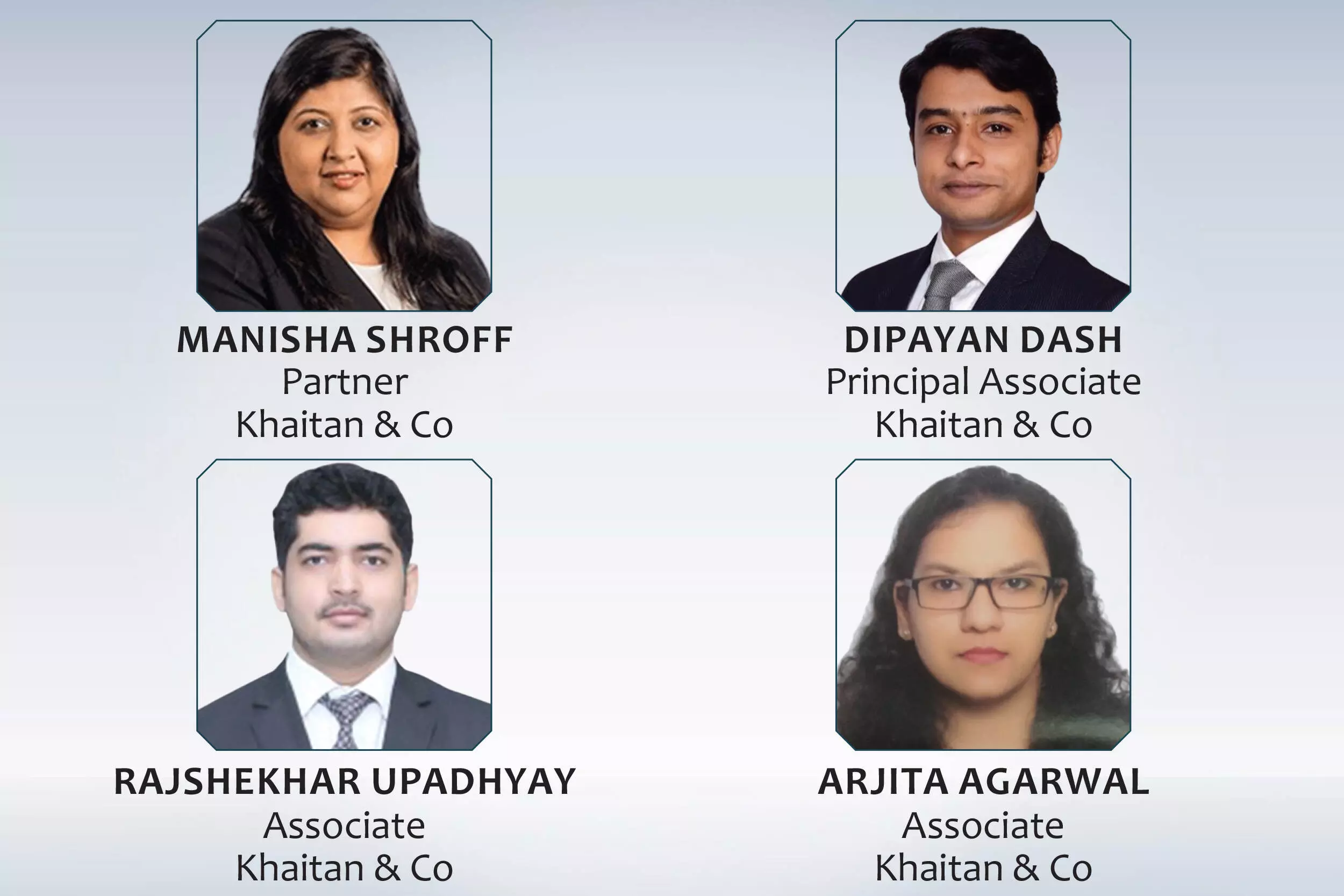- Home
- News
- Articles+
- Aerospace
- Artificial Intelligence
- Agriculture
- Alternate Dispute Resolution
- Arbitration & Mediation
- Banking and Finance
- Bankruptcy
- Book Review
- Bribery & Corruption
- Commercial Litigation
- Competition Law
- Conference Reports
- Consumer Products
- Contract
- Corporate Governance
- Corporate Law
- Covid-19
- Cryptocurrency
- Cybersecurity
- Data Protection
- Defence
- Digital Economy
- E-commerce
- Employment Law
- Energy and Natural Resources
- Entertainment and Sports Law
- Environmental Law
- Environmental, Social, and Governance
- Foreign Direct Investment
- Food and Beverage
- Gaming
- Health Care
- IBC Diaries
- In Focus
- Inclusion & Diversity
- Insurance Law
- Intellectual Property
- International Law
- IP & Tech Era
- Know the Law
- Labour Laws
- Law & Policy and Regulation
- Litigation
- Litigation Funding
- Manufacturing
- Mergers & Acquisitions
- NFTs
- Privacy
- Private Equity
- Project Finance
- Real Estate
- Risk and Compliance
- Student Corner
- Take On Board
- Tax
- Technology Media and Telecom
- Tributes
- Viewpoint
- Zoom In
- Law Firms
- In-House
- Rankings
- E-Magazine
- Legal Era TV
- Events
- Middle East
- Africa
- News
- Articles
- Aerospace
- Artificial Intelligence
- Agriculture
- Alternate Dispute Resolution
- Arbitration & Mediation
- Banking and Finance
- Bankruptcy
- Book Review
- Bribery & Corruption
- Commercial Litigation
- Competition Law
- Conference Reports
- Consumer Products
- Contract
- Corporate Governance
- Corporate Law
- Covid-19
- Cryptocurrency
- Cybersecurity
- Data Protection
- Defence
- Digital Economy
- E-commerce
- Employment Law
- Energy and Natural Resources
- Entertainment and Sports Law
- Environmental Law
- Environmental, Social, and Governance
- Foreign Direct Investment
- Food and Beverage
- Gaming
- Health Care
- IBC Diaries
- In Focus
- Inclusion & Diversity
- Insurance Law
- Intellectual Property
- International Law
- IP & Tech Era
- Know the Law
- Labour Laws
- Law & Policy and Regulation
- Litigation
- Litigation Funding
- Manufacturing
- Mergers & Acquisitions
- NFTs
- Privacy
- Private Equity
- Project Finance
- Real Estate
- Risk and Compliance
- Student Corner
- Take On Board
- Tax
- Technology Media and Telecom
- Tributes
- Viewpoint
- Zoom In
- Law Firms
- In-House
- Rankings
- E-Magazine
- Legal Era TV
- Events
- Middle East
- Africa

Demystifying Sustainability Linked Loans
Demystifying Sustainability Linked Loans

DEMYSTIFYING SUSTAINABILITY LINKED LOANS SLLs are also referred to as ESG (environment social governance) linked loans and are based on the Sustainability Linked Loan Principles (SLLPs) which have been issued under guidelines1 dated 19 March 2019 issued by Loan Market Association, Asia Pacific Loan Market Association and Loan Syndications and Trading...
To Read the Full Story, Subscribe to Legal Era News
Access Exclusive Legal Era Stories, Editorial Insights, and Expert Opinion.
Already a subscriber? Sign in Now
DEMYSTIFYING SUSTAINABILITY LINKED LOANS
SLLs are also referred to as ESG (environment social governance) linked loans and are based on the Sustainability Linked Loan Principles (SLLPs) which have been issued under guidelines1 dated 19 March 2019 issued by Loan Market Association, Asia Pacific Loan Market Association and Loan Syndications and Trading Association.
1. Introduction
Sustainability linked loans or SLLs are loan instruments and/or contingent facilities which incentivize a borrower's achievement of predetermined sustainability performance objectives. SLLs are also referred to as ESG (environment social governance) linked loans and are based on the Sustainability Linked Loan Principles (SLLPs) which have been issued under guidelines1 dated 19 March 2019 issued by Loan Market Association, Asia Pacific Loan Market Association and Loan Syndications and Trading Association. SLLs vary slightly from the green loans in terms of the use of proceeds. While green loan must be used for a specific "green project", SLLs can be used towards general corporate purposes.

The following form the four core principles of SLLPs:
(i) Relationship to borrower's overall sustainability strategy: The borrowers are required to communicate to their lenders, their sustainability objectives which align with its proposed sustainability performance targets.
(ii) Target-setting (measuring the sustainability of the borrower): The sustainability performance targets should be relevant to the borrower's business over the life of the SLL and should be linked to terms and conditions of the SLL to incentivize improvements to the borrower's sustainability profile. One of the aims of an SLL is to encourage positive change through incentives and this should form the basis of target-setting.
(iii) Reporting: The borrowers are required to maintain readily available up-to-date information on their sustainability performance targets and provide this to lenders on a regular basis. The availability of information regarding the sustainability performance targets should also form a part of the information covenants of the SLL loan documentation.
(iv) Review: External review of sustainability performance targets should be ensured. Where information relating to sustainability performance targets is not made publicly available or otherwise accompanied by an audit/assurance statement, it is strongly recommended that borrowers seek external review of its performance of their sustainability performance targets.
2. Salient features of SLLs
Sustainability performance targets or KPIs built into the terms of the SLLs may apply entity-wide or to specific assets of the borrowers and are required to be identified in the SLL loan documentation. The borrowers are incentivized to fulfill the KPIs to avail the pricing benefits of the SLLs which are linked to such KPIs. In order to evaluate borrowers' compliance with such KPIs
(i) The appraisal of SLLs is to be carried out with transparent manner in determining the applicable KPI/sustainability performance target for borrowers. The mechanism for the measurement of the borrower's improvement against a KPI must be carefully considered and should be documented in the SLL loan documentation. Following are the accepted methodologies for ascertaining the sustainability performance targets:
(a) ambitious ESG metrics and targets included in the borrower's sustainability strategies and/or policies;
(b) external analysis to establish sector-specific ESG criteria and best-practice performance;
(c) verified industry metrics reported against frameworks, with verification or evaluation by civil society organizations or external reviewers who will determine if sustainability performance targets are ambitious for the borrower and the borrower's industry, and/or align the sustainability performance targets to existing regulatory targets (such as those set out in the Paris Agreement or in other country/regional/international targets).
(ii) Sustainability performance targets or KPIs built into the terms of the SLLs may apply entity-wide or to specific assets of the borrowers and are required to be identified in the SLL loan documentation. The borrowers are incentivized to fulfill the KPIs to avail the pricing benefits of the SLLs which are linked to such KPIs. In order to evaluate borrowers' compliance with such KPIs.
(iii) Consequences of breach of sustainability-linked provisions: Whilst there is no established market standard in relation to what constitutes a "sustainability" breach, this should be clearly documented in the facility agreement on a case-to-case basis. Although failure to meet the sustainability performance targets may not constitute an event of default under the facility agreement, it would affect the pricing of the SLL for the borrower.
(iv) Exit from sustainability-linked nature of the loan: The SLL can be structured in a manner that the borrower can opt out of setting annual targets or complying with the KPIs and ESG requirements upon such terms and conditions which are mutually agreeable to the parties.
3. International perspective v/s Indian perspective
Internationally, regulatory framework around SLLs have been structured around sustainability disclosure by financial and non-financial companies, by which the companies are asked to periodically report their exposure to the ESG-related risks from their operations. Such disclosures have picked up following the thrust given by G20 by encouraging a voluntary adoption by corporates of the recommendations of the Task Force on Climate-related Financial Disclosures (TCFD). In several countries, directed and concessional lending is practiced to encourage compliance with sustainability-linked targets and disclosures in relation to the same. The establishment of green financial institutions to make available sustainability-linked finance has placed importance on the sustainability-linked targets rather than just production or economic targets.
In India, SEBI mandated the top 1000 listed entities by market capitalization to file Business Responsibility Reports (BRR) as part of their annual report, as per the disclosure requirement emanating from the 'National Voluntary Guidelines on Social, Environmental and Economic Responsibilities of Business' (NVGs) in 2019. The BRR emphasizes on metrics which are quantifiable and allow for easy and accurate intra and inter sector measurement across time periods. Further, the disclosures on climate and social (employees, consumers and communities) related issues of the entity have been significantly enhanced and made more granular.
Further, the RBI has, in its bulletin dated 21 January 2021, highlighted reduction in borrowing cost and information asymmetry as issues which need to be addressed to avoid false claims of environmental compliance and to lead to an efficient resource allocation model. In addition to the above, policy measures such as deepening of corporate bond market, standardization of green investment terminology and consistent corporate reporting have also been stated to have the potential to make a significant contribution in addressing some of the shortcomings of the green finance market. In another bulletin published in May 2016, RBI has also stated that one of the major challenges before Indian and other developing economies is to ensure that sustainability-linked lending is integrated into commercial lending decisions while simultaneously balancing the needs of economic growth and social development. This would necessarily mean setting out on the journey of integrating financial systems and sustainable development which has numerous milestones viz. developing awareness about environmental vulnerabilities, developing a framework of metrics for measuring progress and enhancing capabilities for assessing the risks including environment risks.
Disclaimer – The views expressed in this article are the personal views of the authors and are purely informative in nature.


